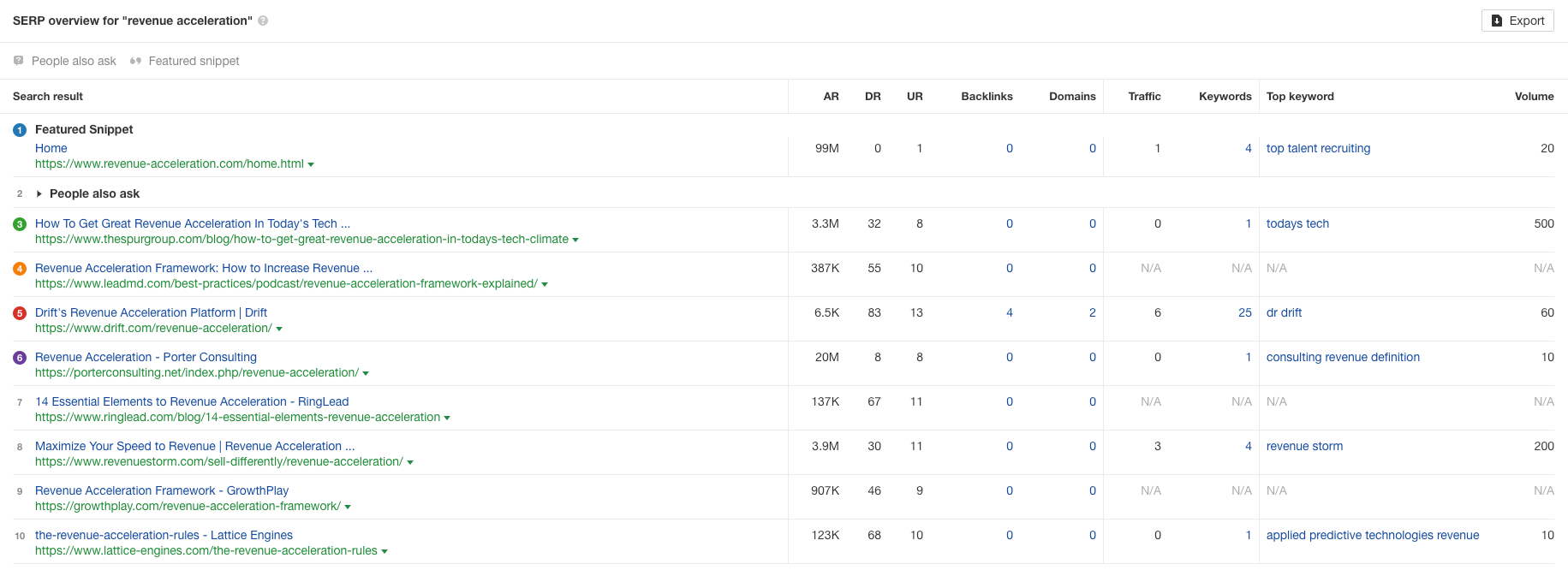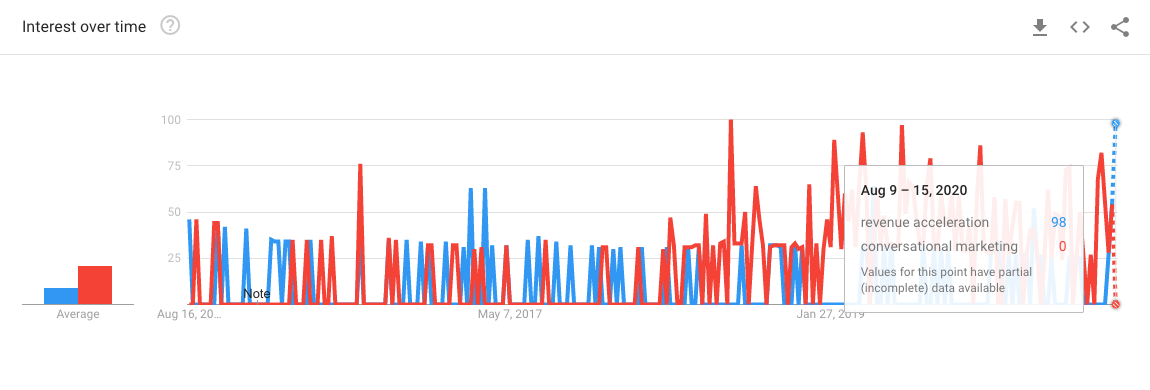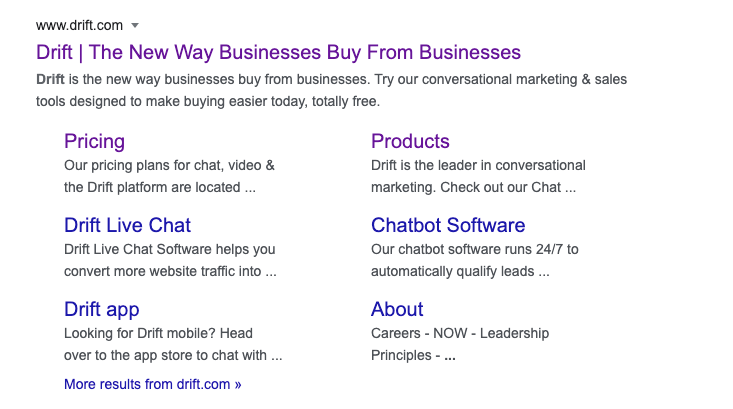Drift and Creating New Categories
Alfred Lua / Written on 14 August 2020
Last week, Drift announced a big shift in their company strategy:
Drift, the leading sales and marketing platform that created the Conversational Marketing category, today announced a new category: Revenue Acceleration. Whereas Conversational Marketing focused on serving marketing, Revenue Acceleration powers an organization, uniting sales and marketing and touching all stages of the customer journey, from the moment someone first interacts with your business to the ongoing relationship they have as a customer.
Few companies have successfully created their own category. The best example in the marketing space is probably HubSpot with Inbound Marketing. Drift has not only done it once with Conversational Marketing (which led to competitors copying it), but it is trying to create a new category again. Will it succeed again?
Categories and marketing eras
Drift's playbook matches the first two laws of The 22 Immutable Laws of Marketing by Al Ries and Jack Trout:
The first law: The Law of Leadership.
It's better to be first than it is to be better. It's much easier to get into the mind first than to try to convince someone you have a better product than the one that did get there first.
But realistically speaking, few startups can do that now unless they have a truly revolutionary product. But fortunately, there's the second law: The Law of Categories.
If you can't be first in a category, set up a new category you can be first in.
Sounds familiar? That is exactly what Drift did—twice. First with Conversational Marketing, then now with Revenue Acceleration. Drift wasn't the first product in the customer chat category, so it created the Conversational Marketing category. Since then, HubSpot introduced HubSpot Conversations, Intercom became the Conversational Experiences platform, and even Salesforce joined the conversational marketing trend with Qualified. Drift probably felt the need to keep moving and, hence, created a new Revenue Acceleration category, where they can be first in.
But it isn't easy to introduce a new category. And the job isn't done once you announce a new category. If you are the only company in the category and no competitors or customers want to be in that category, it isn't useful. I thought Drift did a great job describing this new category and making people want to be a part of it. It closely resembles Andy Raskin's framework in The Greatest Sales Deck I’ve Ever Seen, where he explained the five elements of Zuora's brilliant sales narrative:
- Name a big, relevant change in the world
- Show there’ll be winners and losers
- Tease the promised land
- Introduce features as “magic gifts” for overcoming obstacles to the promised land
- Present evidence that you can make the story come true
In his announcement video, CEO David Cancel described the three eras of marketing: brand, demand generation, and now revenue. He then mentioned some companies have already made the transition to the revenue era and the COVID-19 pandemic has accelerated this change. Then he announced the new category, Revenue Acceleration. It is the combination of conversational marketing and conversational sales to help companies grow revenue and increase customer lifetime value. Finally, on his LinkedIn post, he introduced their new product, Drift Prospector, and linked to a blog post that explained how it can help companies accelerate revenue.
If the shift is already happening and there are tools to help you stay ahead of the trend, well, it sounds good to change as soon as possible. [
Drift Video : Announcing Drift’s Revenue Acceleration platform
Drift Video
 ](https://video.drift.com/v/abQ7D53DDaG/)
The last but not insignificant aspect of this is naming ideas and concepts. As Dave Gerhardt, former VP of Marketing at Drift, said in this interview:
](https://video.drift.com/v/abQ7D53DDaG/)
The last but not insignificant aspect of this is naming ideas and concepts. As Dave Gerhardt, former VP of Marketing at Drift, said in this interview:
“From there, people started to talk about [Drift] as ‘chat for sales, sales chat, marketing chat …’ and we started to talk about it in that way,” Dave said. “But it didn’t really take off until we gave it a name.”
People need an easy way to refer to new ideas, concepts, and ways of doing things. The best example in the marketing world is Inbound Marketing by HubSpot. Instead of saying content marketing, SEO, social media marketing, and so on, marketers can simply say they do inbound marketing. Drift has also introduced new terms ("Revenue acceleration", "revenue era", "not just leads but revenue", "revenue across the entire customer lifecycle") with its announcement to make it easier for people to talk about it. The true test for the success of this new category is if marketers and salespeople would start using these terms.
Well-executed first campaign
One marketing campaign alone isn't sufficient to create a new category. It requires constant marketing to make people remember it, use the term, and want to be a part of it. But for this first campaign, Drift did a great job, in my opinion. There are three things that stood out to me:
1. New product
If you have been reading Yeti Distro, you know I often emphasize the importance of product before marketing. The same is true here. Most marketing doesn't work when the product doesn't fulfill whatever the marketing promises. When it comes to creating a new category, this is even more important. Drift described Revenue Acceleration as combining conversational marketing and conversational sales. Drift technically has a few conversational sales tools already but they were branded as conversational marketing tools. By launching Drift Prospector, specifically a conversational sales product, the team is saying, "Hey, Drift isn't just a conversational marketing tool now. It also helps you with conversational sales." New products would always get more attention, so it's smart to leverage that as a part of the campaign.
2. CEO involvement
David Cancel, CEO and co-founder of Drift, was personally involved in this campaign. He recorded a video announcement and posted it on his LinkedIn profile. He was the person the press team quoted in their press release. He retweeted tweets about the shift.
While this might sound simple, many companies don't do it.
For such a big shift for the company, the CEO should be involved to show how serious the company is about it. Even if the CMO or the highest-ranking marketer were to do it, it wouldn't be as effective. The CEO is the person most customers look towards for such big changes. You see this at the conferences of Apple, HubSpot, Salesforce, and so on where the biggest announcements are always made by the CEO. Creating and moving to a new category is a shift in the entire company strategy, not just a marketing campaign. After all, if the CEO doesn't even talk about it, is it really that important?
3. Consistent messaging
Finally, it felt like a well-coordinated launch, with similar messaging across all channels. The Drift team repeated the same message (new era, revenue acceleration, uniting sales and marketing, directly impacting revenue) in the CEO's announcement, the press release, the landing page, social media, and even the bot on their website. They also used the same terms across their marketing materials: "impacted not only leads but revenue", "revenue across the entire customer lifecycle", "accelerate revenue".
They likely have an internal document for how to talk about this shift. As the company becomes bigger and more people are involved in the campaign, such a document becomes more useful. Having this document also makes it easier to get more people in the company to spread the word about it. It's a common practice we do at Buffer for bigger campaigns.
Will it work?
According to Ahrefs, there is pretty much no search volume for revenue acceleration at the moment. It makes sense. If Drift wants to create a new category, they would want to pick a term that no one or not many people are using.
 Drift's Revenue Acceleration landing page is already ranking fifth for
Drift's Revenue Acceleration landing page is already ranking fifth for revenue acceleration. This isn't much given there is no competition for this keyword yet. But it gives Drift a head start. When more people write about revenue acceleration and search for the term, Drift has a higher chance of getting a backlink than its competitors who might try to follow again.
 Interestingly, according to Google Trends, the interest for
Interestingly, according to Google Trends, the interest for conversational marketing didn't increase much proportionally even after the category have taken off. Perhaps because it is still quite a niche within marketing. Revenue Acceleration might have a chance of becoming more popular simply because it includes more people—sales and marketing.
 What Drift has to do is to keep promoting the concept of revenue acceleration everywhere. What can they do?
What Drift has to do is to keep promoting the concept of revenue acceleration everywhere. What can they do?
A common tactic is to write a book. Brian Halligan and Dharmesh Shah of HubSpot wrote Inbound Marketing: Get Found Using Google, Social Media, and Blogs; David Cancel and Dave Gerhardt wrote Conversational Marketing: How the World's Fastest Growing Companies Use Chatbots to Generate Leads 24/7/365 (and How You Can Too). If you want to be the authority in a category, you write a book. It seems silly but it works.
Similarly, Drift should create a ton of content (or SEO topic clusters, as I might say) around the new category, which I'm sure they are doing already. "What is revenue acceleration" is an obvious one to start with. A few other topics they would explore are:
- How can sales and marketing work together
- How to impact revenue across the entire customer lifecycle
- Customer lifecycle: new customer acquisition, customer engagement, renewal, advocacy, and expansion
- The three eras of marketing
- Conversational marketing and conversational sales
- Revenue over leads
- Tools for revenue acceleration
Because revenue acceleration still an unknown term right now, Drift has the ability to shape the sub-topics around it and influence what people search about it.
Another thing Drift could do is to work with its certified partners (i.e. agencies). "Conversational marketing agency" is now a thing. This is a win-win situation for Drift and the agencies because Drift gets help promoting its products while agencies get to seem more legit. Drift could work with these agencies to shift the language from conversational marketing to revenue acceleration. Revenue acceleration also sounds better. Compare "we help you with conversational marketing" with "we help you accelerate revenue growth". I'm sure the latter will get agencies more businesses.
Surprisingly, Drift has not updated their homepage title (even though they did update their hero message on the homepage) or social media profiles. If they really want to push this category into people's mind, I think these changes, while tiny, will be helpful, especially because it creates consistent messaging across all customer touchpoints.
 Whether they will succeed creating this new Revenue Acceleration category will depend on how hard and consistently they push this new concept. Given how Drift created the Conversational Marketing category and led to companies like Salesforce, HubSpot, and Intercom to follow them, I'm confident they will succeed this time.
Whether they will succeed creating this new Revenue Acceleration category will depend on how hard and consistently they push this new concept. Given how Drift created the Conversational Marketing category and led to companies like Salesforce, HubSpot, and Intercom to follow them, I'm confident they will succeed this time.
(Fun fact: I have a t-shirt with their original name Driftt. I guess it's limited edition now!)